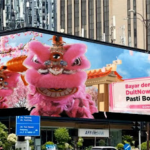The advertising industry’s failure to contemporise impacts the effectiveness of individual adverts and campaigns.
Globally, men are 38% more likely than women to be featured prominently in ads.
However, the research shows that progressive ads, for example those led by authoritative female characters, outperform other ads.
At a high level, this means male-skewed brands are missing out on an average of $9 billion in brand valuation globally. In addition, many people see these traditional expressions of men and women in advertising as holding back progress, with 60% in the APAC region and 63% in Malaysia agreeing that most ads in their country reinforce rather than help eradicate harmful gender-based stereotypes.
The vast majority (83%) of marketers in Asia Pacific think they are doing a good job of creating advertising that avoids gender stereotypes.
However, audiences disagree, with two thirds (63%) of people in the region and (62%) in Malaysia saying that advertising conforms to gender stereotypes, according to Kantar’s newest analysis of advertising creativity and media effectiveness.
Commenting on the study’s findings, Ian Kwan, Chief Commercial Officer of Kantar Insights Division said, “While half of Malaysians agree that the way their gender is portrayed in advertising is a reflection of reality, the majority also feel that advertising in this country typically conforms to gender stereotypes. However, we know that advertising has the potential to change the conversation. Progressive ads with authentic stories do well with audiences of both genders. Brands that want to journey through this with consumers need to start with ads that are carefully tested, handled sensibly, based on cultural and consumer understanding.”
Key Findings:
- 83% of marketers in APAC think their advertising avoids gender stereotypes.
- 62% Malaysians say advertising conforms to gender stereotypes
- When both genders appear in ads, men are 38% more likely to be featured prominently than women
- The industry struggles to make great ads starring women
Download full study here: www.kantar.com/adreaction
The latest AdReaction study from Kantar, includes analysis of 30,000 ads, survey responses of 450 global marketers, consumer advertising attitudes among almost 40,000 consumers, and brand equity analysis of over 9,000 global brands to create an in-depth understanding of the role of gender in advertising.
MARKETING Magazine is not responsible for the content of external sites.









